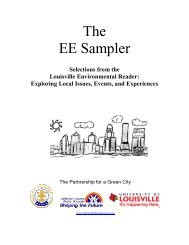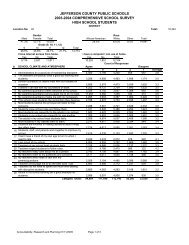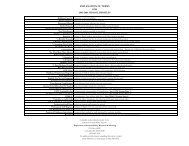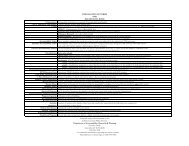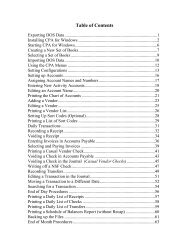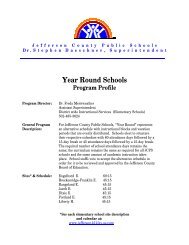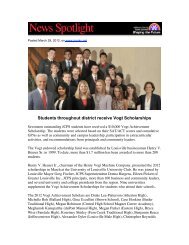Yellow Jacket Times - Jefferson County Public Schools
Yellow Jacket Times - Jefferson County Public Schools
Yellow Jacket Times - Jefferson County Public Schools
Create successful ePaper yourself
Turn your PDF publications into a flip-book with our unique Google optimized e-Paper software.
It’ Not Always Your Choice<br />
Antwone Sloss<br />
People fear the doctor office, not because of the bad news<br />
they may receive, because of the bill they will receive.<br />
When Americans go to the doctor for their routine checkup, they feel as though they are<br />
in good health. The doctor routinely focuses on 3 things. The first is that they are<br />
overweight, but who in America isn’t? The second thing the doctor tells the patient is that<br />
they are in need of a new vaccine to protect them from either a new or ancient disease that<br />
is plaguing the world. The last thing the doctor says is to ask if the patient chooses to<br />
receive the vaccine or choose to cope with the horrendous consequences if they don’t.<br />
These side effects can be swelling and redness of the eye, stomach aches, cramps, tingling<br />
and irritation to the skin, difficulty breathing, fever, dizziness, tiredness, sweating, muscle<br />
pain, insomnia, earache, nausea, diarrhea, and other flu-like symptoms that the medicine<br />
is supposed to treat or prevent the patient from having. As Americans, we’re supposed to<br />
have the best medical care of any country in the world, but how can this be true when we<br />
have corrupt government agencies, doctors, and pharmaceutical companies trying to get<br />
our money?<br />
Who is on the TV telling you that you need a new hip replacement or a new medicine to<br />
stop the inevitable disease you are positive to get. Is it a doctor, or a money hungry<br />
company paying a doctor to tell you vague facts? If a commercial tells you 60% of all<br />
people over 50 need a hip replacement, did they survey 1000 people or just 10 people<br />
they found limping down the street. Medical companies try to draw in vulnerable people<br />
in hopes of getting a portion of the 200 billion dollar a year American drug industry.<br />
These vulnerable people include the elderly who are trying to lengthen their lifespan,<br />
woman who want to get procedures done to their body parts, and men who are insecure<br />
about their private area.<br />
Medical companies lure us into buying unnecessary drugs and medical supplies, with<br />
phony statistics and results, in exchange for our paychecks. A prime example is the male<br />
enhancement pill companies. These companies charge men extraordinary prices for these<br />
pills in exchange for improving their love life, but is this reward worth the risk? They<br />
don’t tell these frantic men that, in return for their money, they will also have the<br />
opportunity to receive irregular heartbeats, hearing impairment, restlessness, poor vision,<br />
and sleeplessness, as well as seizures and an agonizing death.<br />
When you hear the word generic, you think cheap. When big time drug companies hear<br />
generic, they think expensive. While we buy generics to save a little money, big<br />
manufactures spend their money trying to get rid of them. We buy the generics of a<br />
product sometimes, but why don’t we buy more generic medicines? The reason we don’t<br />
buy much generic medicines is because big drug companies spend their money to say that<br />
there product contains the more quality ingredients, and will prove to be more beneficial<br />
to us if we are willing to spend more money.<br />
It can take decades for a<br />
brand-name drug to<br />
become available as a<br />
generic. The initial patent<br />
life of a new drug is 20<br />
years, but a patent can<br />
be obtained at any point<br />
in the drug-development<br />
stage. If a patent is<br />
obtained early, research<br />
and development time<br />
may eat up a decade or<br />
more of patent life before<br />
the FDA approves the<br />
drug for use. A patent<br />
obtained later in the<br />
development process<br />
may buy more time for<br />
the drug to be sold under<br />
patent protection.<br />
When two or more<br />
generic manufacturers<br />
make a drug, the price of<br />
the generic drug is often<br />
about 50 to 95 percent<br />
less than the cost of the<br />
brand-name drug. The<br />
extent of the price drop<br />
usually depends on how<br />
many manufacturers<br />
make the drug and how<br />
difficult the drug is to<br />
make.<br />
it doesn't hurt to ask your<br />
doctor or pharmacist if<br />
there's a generic<br />
alternative to any name<br />
brand drug you're taking.<br />
Source<br />
Little do people know, the FDA, (which all of us hear every day but don’t know what the abbreviation stands for) requires<br />
generic drugs to have the same quality and performance as brand name drugs. For the math whizzes, this means that<br />
Generic Drugs are greater than or equal to name brands. So next time you go to the store for cold medicine, it would be<br />
smarter to buy the $5 Walgreens Cold and Flu medicine, instead of the $13 Vicks Nyquil.<br />
References:<br />
http://www.cdc.gov/<br />
http://www.fda.gov/<br />
http://www.mayoclinic.org/medical-edge-newspaper-2012/feb-03b.html



